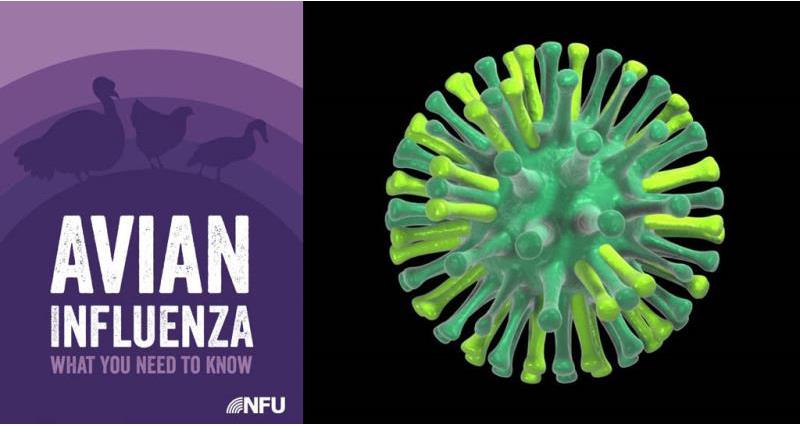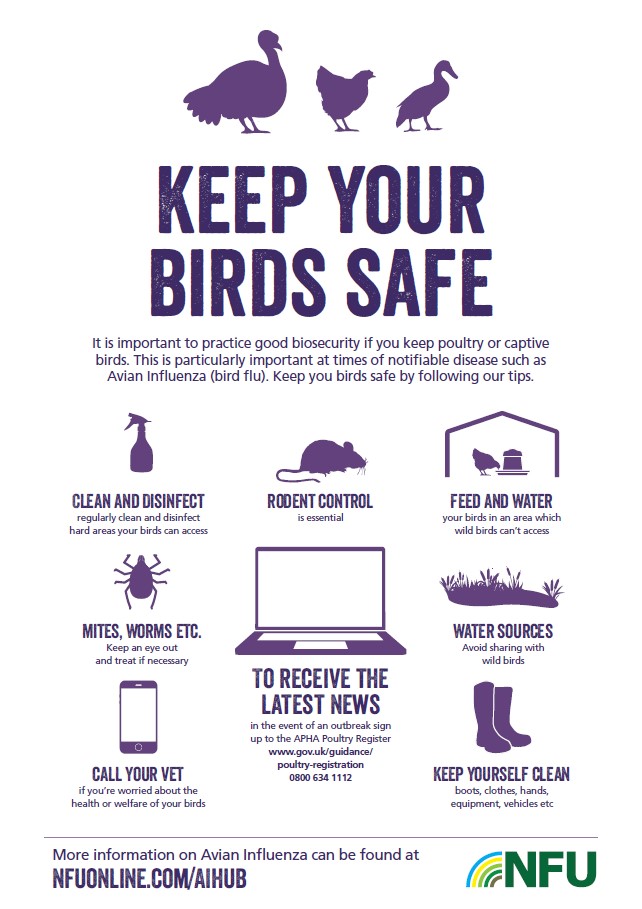INFORMATION ON THIS PAGE
Any dead waterfowl or wild birds that you find on your land must be reported to Welsh Government or call the Defra helpline on 03459 335577 so they can be tested.
As of 29 November 2021, it is a mandatory requirement that all bird keepers across the UK keep their birds indoors and follow strict biosecurity measures to limit the spread of avian influenza.
Get advice from your vet if you are ever worried about the health of your birds.
Latest news
To keep up to date with the latest cases as they happen head over to our latest news page.
The situation as it has developed
29 November 2021 – mandatory housing measures came into force across the UK – all captive bird keepers are required to house their birds to prevent the spread of avian influenza. This is in addition to the biosecurity measures already in place as part of the Avian Influenza Prevention Zone that came into force on 3 November.
21 November 2021 – an enhanced Avian Influenza Prevention Zone was introduced in parts of North Yorkshire. This included mandatory housing for all captive birds within the area. Please note, this housing order is now mandatory across Great Britain.
14 November 2021 – the first general licence was published. There are currently six general licences in place for a range of activities. For more information on these and individual movement licensing please visit the licensing page on NFUonline.
8 November 2021 – the government announced that gatherings of poultry, galliforme or anserisforme birds were no longer permitted in England and Wales.
3 November 2021 – a nationwide Avian Influenza Prevention Zone (AIPZ) came into force across England, Scotland and Wales. This includes stricter measures on biosecurity to prevent the spread of AI.
26 October 2021 – the first case of highly pathogenic H5N1 was confirmed in Great Britain. To stay up to date with the latest cases as they happen, head over to our latest news page.?
Advice and guidance
Whether you keep just a few birds or thousands, you are now legally required to introduce higher biosecurity standards on your farm or small holding. It is in your interests to do so in order to protect your birds from this highly infectious disease.
- What to do if you're in a Restricted, Protection or Surveillance Zone
- Watch again: Avian influenza update from the Chief Veterinary Officer
- Government advice can be found on the Avian Influenza page.
READ: Avian influenza: Guidance if you have birds on farm
Biosecurity - keeping your birds safe
Only 1g of infected faeces is required to cause one million birds to die, therefore keeping everything that is going in and out of the shed to a minimum and as clean as possible, is the only way to minimise the risk of AI.
Defra has put together some guidance on biosecurity and preventing disease in a Prevention Zone which has good biosecurity points worth following.
Chief Veterinary Officer, Christine Middlemiss, advises the following:
- Cleansing and disinfecting clothing, footwear, equipment and vehicles before and after contact with poultry – if practical, use disposable protective clothing
- Reducing the movement of people, vehicles or equipment to and from areas where poultry are kept to minimise contamination from manure, slurry and other products and using effective vermin control
- Thoroughly cleaning and disinfecting housing at the end of a production cycle
- Keeping fresh disinfectant at the right concentration at all points where people should use it, such as farm entrances and before entering poultry housing or enclosures
- Minimising direct and indirect contact between poultry and wild birds, including making sure all feed and water is not accessible to wild birds.
In a joint statement, the Chief Veterinary Officers for England, Scotland and Wales said:
“Following a number of detections of avian influenza in wild birds across Great Britain we have declared an Avian Influenza Prevention Zone across the whole of Great Britain. This means that all bird keepers must take action now to prevent the disease spreading to poultry and other domestic birds.
“Whether you keep just a few birds or thousands, you are now legally required to introduce higher biosecurity standards on your farm or small holding. It is in your interests to do so in order to protect your birds from this highly infectious disease.
“The UK health agencies have confirmed that the risk to public health is very low and UK food standards agencies advise that bird flu poses a very low food safety risk for UK consumers.”
Your health and wellbeing
It is understandable, during these times, to feel an increase in stress or anxiety. There are a number of rural charities and support networks that can offer help to those in need.
If you are struggling or know someone who is, know that you are not alone and the below helplines are here to support:
- FCN: 03000 111 999
- RABI: 0808 281 9490
- DPJ Foundation: 0800 587 4262
- YANA: 0300 3230 400
RABI has created an online farming community where you can access free, safe and anonymous online mental wellbeing support from any device – find it here.
Farmwell has also published useful personal resilience guidance.
The Prince's Countryside Fund has a list of Farm Support Groups, local organisations and charities working across the UK, supporting people working in agriculture and rural communities.
Public information on reporting
Members of the public are encouraged to report dead wild waterfowl (swans, geese or ducks) or gulls, or five or more dead wild birds of other species in the same location to the Animal and Plant Health Agency (APHA) helpline on 0300 303 8268.
If you’re concerned with the health of any of your own birds please contact your veterinary surgeon, or if you think they are showing signs of disease please contact your local APHA office.
More from NFUonline:

